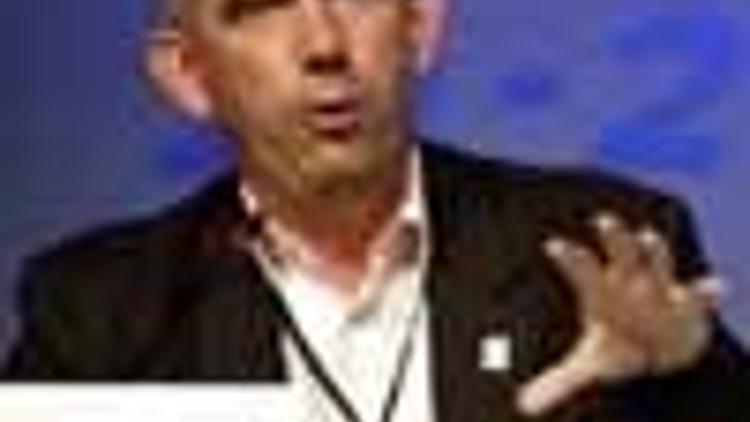Regional acts no mask for reforms
Güncelleme Tarihi:

Hürriyet Daily News
Oluşturulma Tarihi: Kasım 28, 2008 00:00
ANKARA - Turkey has been told by a European official the foreign policy it has initiated in the region does not change the need for reforms and repeated concern over the slow progress being made in improving freedoms of expression and granting rights to the Alevis and Kurds.
"The heart of EU accession is not strategy, but democracy," said Joost Lagendijk, the head of the Turkish-European Union Joint Parliamentary Committee.
The Turkish-EU Joint Parliamentary Committee meeting began in the capital and will continue today. European parliamentarians visiting Turkey on a fact-finding mission said there was a visible stagnation in the political criteria required for full membership of the EU.
Lagendijk said the European parliament's forthcoming report on Turkey would praise positive developments in Turkish-Armenian relations and the Turkish president's landmark visit to Armenia in September.
He also welcomed direct contact between Ankara and the Iraqi Kurdish leaders but stated Turkey's increasing strategic importance could not be a substitute to domestic reform.
European support for Kurdish television
Lagendijk welcomed the Kurdish broadcast, which will start on Turkish Radio and Television, or TRT, for 12 hours each day as of Jan. 1, as an important step and expressed the wish to see progress on the rights of Alevis.
In the meantime, Lagendijk also met with Freedom and Solidarity Party, or ÖDP, leader, Ufuk Uras. The European parliamentarian said he had observed President Abdullah Gül’s determination over the EU process, while Prime Minister Recep Tayyip Erdoğan was pragmatic about the matter, learned the Hürriyet Daily News & Economic Review.
Turkey's State Minister Mehmet Şimşek also attended the meeting and responded to questions from the Greek Cypriot member of the European parliament, Marios Matsakis, who complained about the government's defense expenditure. Şimşek replied if Turkey became a member of the EU, the country would not be in need of such a big army.
Dink issue unresolved
Late Wednesday, the French ambassador to Ankara, Bernard Emie, whose country is currently holding the term presidency of the EU, gave a reception on the occasion of the visit of members of the European parliament’s human rights sub-committee and the foreign affairs committee.
Helen Flautre, head of the European parliament’s human rights sub-committee, expressed curiosity about the content of the report drafted by the Prime Ministry Inspection Board concerning the assassination of the Turkish-Armenian journalist, Hrant Dink. "We would like to learn the truth about the assassination," she said.
She also touched on the government’s plans to build an additional prison and transfer six inmates to the İmralı island off Istanbul where the leader of the outlawed Kurdistan Workers’ Party, or PKK, Abdullah Öcalan, is imprisoned. Flautre said the decisions of the European Court of Human Rights must be fully implemented. "This is important for both Öcalan and other inmates," she said and added long-term isolation meant ill treatment and that if the Turkish government decided to end the isolation, that was a good thing.
The Turkish-EU Joint Parliamentary Committee meeting began in the capital and will continue today. European parliamentarians visiting Turkey on a fact-finding mission said there was a visible stagnation in the political criteria required for full membership of the EU.
Lagendijk said the European parliament's forthcoming report on Turkey would praise positive developments in Turkish-Armenian relations and the Turkish president's landmark visit to Armenia in September.
He also welcomed direct contact between Ankara and the Iraqi Kurdish leaders but stated Turkey's increasing strategic importance could not be a substitute to domestic reform.
European support for Kurdish television
Lagendijk welcomed the Kurdish broadcast, which will start on Turkish Radio and Television, or TRT, for 12 hours each day as of Jan. 1, as an important step and expressed the wish to see progress on the rights of Alevis.
In the meantime, Lagendijk also met with Freedom and Solidarity Party, or ÖDP, leader, Ufuk Uras. The European parliamentarian said he had observed President Abdullah Gül’s determination over the EU process, while Prime Minister Recep Tayyip Erdoğan was pragmatic about the matter, learned the Hürriyet Daily News & Economic Review.
Turkey's State Minister Mehmet Şimşek also attended the meeting and responded to questions from the Greek Cypriot member of the European parliament, Marios Matsakis, who complained about the government's defense expenditure. Şimşek replied if Turkey became a member of the EU, the country would not be in need of such a big army.
Dink issue unresolved
Late Wednesday, the French ambassador to Ankara, Bernard Emie, whose country is currently holding the term presidency of the EU, gave a reception on the occasion of the visit of members of the European parliament’s human rights sub-committee and the foreign affairs committee.
Helen Flautre, head of the European parliament’s human rights sub-committee, expressed curiosity about the content of the report drafted by the Prime Ministry Inspection Board concerning the assassination of the Turkish-Armenian journalist, Hrant Dink. "We would like to learn the truth about the assassination," she said.
She also touched on the government’s plans to build an additional prison and transfer six inmates to the İmralı island off Istanbul where the leader of the outlawed Kurdistan Workers’ Party, or PKK, Abdullah Öcalan, is imprisoned. Flautre said the decisions of the European Court of Human Rights must be fully implemented. "This is important for both Öcalan and other inmates," she said and added long-term isolation meant ill treatment and that if the Turkish government decided to end the isolation, that was a good thing.

